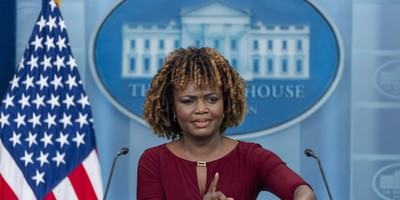The following is an exclusive column given to Townhall in the words of Capt. George W. Starks, now aged 94, as told to Carole Avriett. The story of Capt. Starks and his nine crew members is told in full in Avriett’s newly-released title, Coffin Corner Boys: One Bomber, Ten Men, and Their Harrowing Escape from Nazi-Occupied France.
On March 16, 1944, my B-17 crew and I took off from Podington, England, for our bombing mission into Germany. We were over northeastern France when we were hit, and I had to order my crew to bail out. Many times during training we had been cautioned to be very, very careful who we talked to and who we trusted if we were shot down.
So on that first afternoon after I parachuted down, I hid in the brush next to a cultivated field—had no idea what might happen next. I knew Germans were probably all around. I figured they had seen us, knew where the plane had crashed, and would be scouring the countryside. One walked just a few feet from me; I held my breath, my heart pounding.
But the German soldier moved on, and later a Frenchman came slowly walking along, whistling—sort of a signal-type whistle. I didn’t know what else to do except confront him and hope for the best.
He pulled a small flask of wine from his jacket, some cigarettes, a piece of cheese, and black bread. It tasted so good. Later he took me into the village to the home of a woman who lived there with her young daughter. Through sign language and broken English, I learned that her husband was Polish and a POW. It suddenly hit me that if she were caught, she and her daughter would probably be shot instantly.
That night several villagers brought me French-style workman-like clothing, an overcoat, and a knapsack. They had filled the sack with some food items. Then the lady, Josefa Wilczynska was her name, let me sleep on a small cot next to her kitchen. I slept in my clothes, and when I woke early the next morning, I was still clutching the knapsack they had given me.
Recommended
I really didn’t want to leave that house. For a few minutes I felt safe, but I knew I couldn’t stay—I was in danger of being found, and these people were in danger of being discovered helping an American airman. As I started my long walk toward Switzerland, it was the same each time I was given shelter in someone’s house: I didn’t want to leave. But I knew I had to keep going…
On that first morning as I said good-by to this brave woman, I thought about what she and the others in the village had done for me. And I wondered what in the world had happened to each of my crew—I knew we had come down scattered over a broad area. I made two pledges to myself: if I survived this ordeal that lay ahead of me, I would never lose touch with my crew again; second, if possible, one day I would return to France to find these brave souls again and thank them for saving my life.
After the war, I tried to make good on both those promises. I went back to France several times and located almost all of those who had helped me. I also located all my crew here in the States and went to see them when I could.
One of those visits stands out vividly in my mind. It was in August 1983. I had located most of my crew and finally found Don Edgerly, who had been my engineer. My wife and I traveled to be with him at his home in Wapato, Washington.
We spent two glorious days together, laughing, reminiscing, sharing tears. We talked about one young French couple with children who had taken him, Bill Wyatt, and Bob Williams, the ball turret gunner and radio operator respectively, into their home, allowed them to sit in front of their fireplace to get warm, and shared what food they had with them. We both knew what an incredibly dangerous thing that was for them to do.
Yet this French family wasn’t the only one. We each could remember so many who had done similar things for us as we battled to get to freedom.
It was a bittersweet visit because when I finally got home from my trip, I had a letter awaiting me from Don’s wife. Sadly, it wasn’t thanking me for coming to see her husband. Unbelievably, my dear friend had passed away on August 24, 1983, the day after I left his home in Wapato.
I keep in touch even today with Don’s grandson, Bruce, whom I met on that trip in 1983. Because of the unselfish courage of all those French men, women, and children who helped us as well as many from the organized groups such as the French Resistance, the Underground, and the Maquis, all ten of us made it back to the States to marry and have families of our own. In fact, collectively we had 27 children, which led to 58 grandchildren, 22 great-grandchildren, 6 great-great-grandchildren…and counting. More than a hundred souls came to life because each man made it home.
Now I am the only one left of my crew. And many of those who helped us in France have passed on also. Just like my crew, they have younger ones who remain. Memorial Day is a time for remembering all those who were important in your life during a time of war when hardship and trial, danger and strife, are daily fare. But war is also a time of bravery and sacrifice beyond words—and friendships forged in those fires are friendships that remain forever.

























Join the conversation as a VIP Member